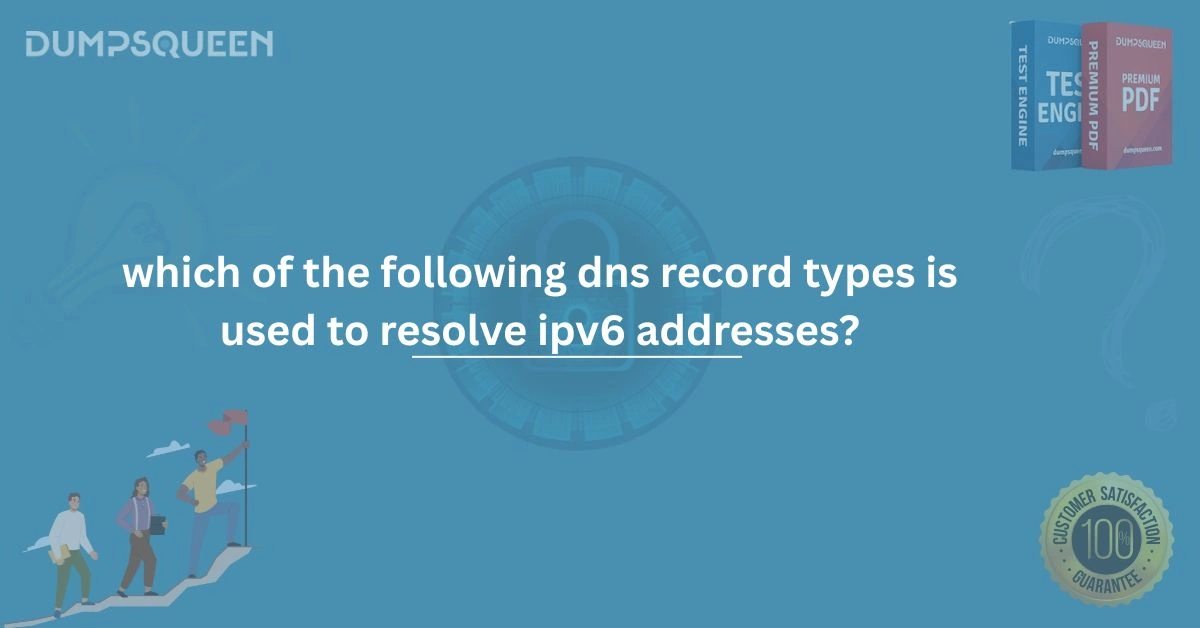Introduction
In the evolving landscape of modern networking, Domain Name System (DNS) plays a pivotal role in translating human-friendly domain names into machine-readable IP addresses. This translation process is essential for enabling communication between devices across the globe. As the internet increasingly moves toward adopting Internet Protocol version 6 (IPv6) to resolve the limitations of IPv4, understanding DNS record types becomes critically important especially for IT professionals preparing for industry certifications. Among the various DNS record types, one specific record type is responsible for resolving IPv6 addresses. In this blog, brought to you by DumpsQueen, we will explore which of the following DNS record types is used to resolve IPv6 addresses, examine how this record functions, and break down its significance in network architecture and IT certification exams. Whether you are studying for a certification like Cisco CCNA, CompTIA Network+, or Microsoft Azure, knowing this detail will help you stand out. Let’s dive deep into how DNS facilitates IPv6 communication and why knowing this answer is crucial for your technical success.
Understanding DNS and Its Role in IP Address Resolution
To fully grasp the relevance of DNS record types, we must first understand what DNS is and how it functions. The Domain Name System is akin to the phonebook of the internet. While humans access websites via domain names like computers and routers communicate using IP addresses such as 192.168.1.1 or its IPv6 counterpart like 2001:0db8:85a3:0000:0000:8a2e:0370:7334. DNS bridges this gap by converting user-friendly domain names into IP addresses that the network layer of the OSI model understands. This process is seamless for end users but involves a complex behind-the-scenes system of DNS queries, responses, and authoritative name servers. DNS records are the entries stored in DNS databases, which guide the resolver in converting the domain name to its corresponding IP.
IPv4 vs IPv6 – Why It Matters
IPv4 has served the internet reliably for decades, offering over 4 billion unique addresses. However, with the exponential increase in connected devices smartphones, laptops, IoT gadgets, and more the exhaustion of IPv4 addresses became inevitable. This is where IPv6 steps in. IPv6 introduces a much larger address space (128-bit addresses compared to IPv4’s 32-bit), allowing trillions of devices to be uniquely identified online. But resolving these addresses requires DNS to handle queries differently. Therefore, a different DNS record type is required to map domain names to IPv6 addresses. Identifying this record type is the crux of our exploration.
The Key DNS Record Type for IPv6 Resolution
When asked "which of the following DNS record types is used to resolve IPv6 addresses?", the correct answer is unequivocally the AAAA record. The AAAA (quad-A) record is an extension of the A record, which is used for IPv4 address resolution. While an A record maps a domain to a 32-bit IPv4 address, the AAAA record maps a domain to a 128-bit IPv6 address. This allows domain names to resolve into the newer IP format introduced with IPv6. For example, if a website such as is configured to support IPv6 traffic, its DNS settings will contain an AAAA record that maps it to an IPv6 address like 2001:4860:4860::8888.
How AAAA Records Function in Practice
When a DNS query is made, it can return different types of records depending on the device's capabilities and the nature of the request. Here's how it typically works:
-
A user enters a domain name into their browser.
-
The DNS resolver checks the cache. If there's no cached result, it queries an authoritative DNS server.
-
If the client supports IPv6, the resolver first checks for an AAAA record.
-
If found, the AAAA record returns the IPv6 address, and the device uses this for network communication.
If the device does not support IPv6 or an AAAA record is not available, it falls back to an A record for IPv4 resolution. This dual-stack capability ensures backward compatibility as the world gradually transitions to IPv6.
Importance of AAAA Records in Modern Networking
As internet service providers (ISPs), data centers, and enterprises continue rolling out IPv6, AAAA records are becoming increasingly vital. They enable seamless connectivity in environments where IPv6 is prioritized or exclusively supported.
Here’s why understanding AAAA records is especially crucial for certification aspirants:
-
Network+ and CCNA exams frequently test your knowledge of DNS functionality.
-
Cloud certifications like AWS and Azure include scenarios requiring DNS configurations with IPv6.
-
Security exams may evaluate your ability to trace and interpret DNS queries in dual-stack environments.
Mastering this foundational concept can give you a technical edge in real-world networking and certification success.
Common Misconceptions About DNS Records and IPv6
Even among seasoned professionals, there are a few common misunderstandings related to DNS and IPv6:
-
“A records work for both IPv4 and IPv6.”
– False. A records only resolve IPv4 addresses. AAAA records are required for IPv6. -
“AAAA records are optional.”
– Partially true. While optional in dual-stack environments, AAAA records are essential in pure IPv6 networks. -
“Adding an AAAA record replaces an A record.”
– Incorrect. Both can coexist, allowing devices to choose based on their IP stack compatibility. -
“IPv6 is still not widely used.”
– This is rapidly changing. Many modern networks, especially in Asia and Europe, have significant IPv6 deployment.
Clearing up these misconceptions will not only make you a better network engineer but also help you avoid pitfalls in exams and interviews.
How DumpsQueen Supports Your Learning Journey
At DumpsQueen, we understand how crucial it is to master detailed concepts like DNS record types for exam success. That’s why we provide expertly curated study guides, practice questions, and exam dumps that align perfectly with real exam content. Whether you’re studying for Cisco 200-301, CompTIA Network+ N10-008, or Microsoft AZ-700, DumpsQueen delivers up-to-date, exam-relevant material. With us, you don’t just memorize you learn strategically. We’ve helped thousands of candidates achieve their IT certification goals, and we’re here to help you too.
Free Sample Question
Q1. Which of the following DNS record types is used to resolve IPv6 addresses?
A. A
B. MX
C. CNAME
D. AAAA
Answer: D. AAAAQ2. What is the primary difference between an A record and an AAAA record in DNS?
A. A record is used for mail servers; AAAA is used for aliases
B. A record resolves IPv4 addresses; AAAA resolves IPv6 addresses
C. A record is dynamic; AAAA is static
D. A record requires a domain; AAAA does not
Answer: B. A record resolves IPv4 addresses; AAAA resolves IPv6 addresses
Q3. What happens if a device only supports IPv6 and no AAAA record is available for the queried domain?
A. The device uses the CNAME record
B. The device falls back to IPv4
C. The device cannot reach the domain
D. The DNS resolver converts the A record to IPv6
Answer: C. The device cannot reach the domain
Q4. Why are AAAA records increasingly important in cloud and enterprise networks?
A. Because they eliminate the need for DHCP
B. Because IPv6 allows faster browsing
C. Because they enable resolution in IPv6-only environments
D. Because IPv6 replaces DNS entirely
Answer: C. Because they enable resolution in IPv6-only environments
Conclusion
DNS is the backbone of how we navigate the internet, and with the global shift toward IPv6, understanding DNS record types is more crucial than ever. When presented with the question "which of the following DNS record types is used to resolve IPv6 addresses?", the answer is clear: the AAAA record.Knowing this not only prepares you for networking certifications like CCNA, CompTIA Network+, and Microsoft exams but also strengthens your practical skills in configuring modern networks. At DumpsQueen, we pride ourselves on empowering IT professionals with the knowledge and resources needed to succeed. From exam dumps to practice tests, we offer everything you need to master even the most complex networking topics. Stay ahead of the curve with DumpsQueen your trusted partner in IT certification.




